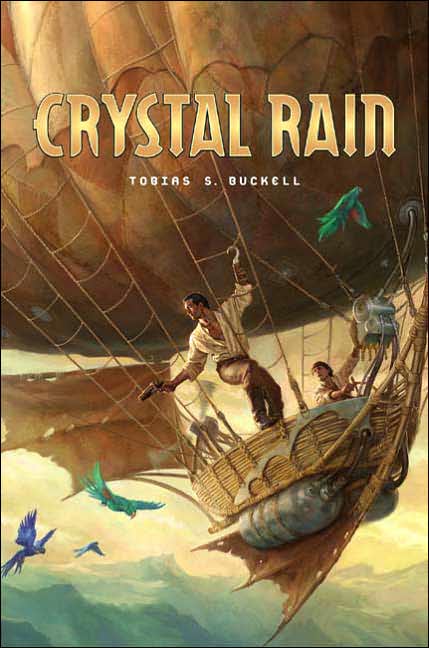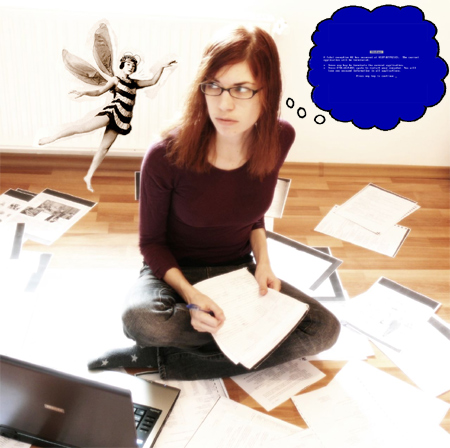Tobias Buckell is the author of numerous short stories and novelettes (many appearing in his collection Tides from the New Worlds); the “caribbean steampunk” novel Crystal Rain and its successors Ragamuffin and Sly Mongoose; and the New York Times bestselling Halo novel The Cole Protocol. He is also a well-known blogger, a past Writers of the Future winner, and a fellow member of the Codex writers’ group. Knowing both about his many successes and about the surprising number of difficulties he’s overcome, I asked to interview him about his writing and his motivation through hard times. This is the final installment of that three-part interview.
The impact from your medical condition on your writing time sounds very disheartening, and I imagine things only got more complicated (although admittedly with compensations) when Calliope and Thalia were born. What got you from being depressed and in disorder with your writing schedule to regaining your focus and getting back on track? Was support from others particularly important, or the experience of the work itself, or other steps you took?
Well, the kids took up some time, but they keep you from focusing on yourself to focusing on them, which was a good thing. It was tough from January to September of 2009, but mainly I kept my eye on the prize. I was alive, I got to write a little bit, and starting in September I’d have enough to go back to mostly writing. And I was grateful that even though I wasn’t getting to write as much as I preferred and loved, I still was a freelancer. This meant I had a life where I could work when I had the strength, and sleep when I needed, which was great for that recovery time. In April, with newborns, I was able to have a flexible schedule and be around my kids as much as I needed.
 When September rolled around, it was a case of just being excited to do what I loved the most, even though I knew there was this 11 month or so hole in my career.
When September rolled around, it was a case of just being excited to do what I loved the most, even though I knew there was this 11 month or so hole in my career.
As a writer you have to love the work, and being inside the work. And that’s what I turned to as soon as I could. I started work on a young adult novel, which was a new kind of project. And it wasn’t due, so there was no pressure. I just hard to work on it every day. Just being inside a novel and working on it, living in that moment, and figuring out for the first time what my new energy levels were like, was a discovery period.
I also took the time to destress myself. I’d pushed myself too hard in Montreal for Worldcon. I ended up in a Montreal cardiac center. And I ended up getting a doctor who told me my condition was like asthma: potentially life threatening if I ignored it. But if I took things easy and built my life around realizing I had it, and then got on with life, I’d probably die of something else first (which was the case of his older patients who had my same heart condition). He told me I needed to not physically or emotionally stress myself out.
So I had a doctor’s excuse now. I negotiated out of deadlines as best I could, and just started focusing on the writing for its own sake. It would get turned in when I turned it in.
That ended up being remarkably freeing and, oddly enough, made me more productive over the next 9 months than I have been since I first wrote Crystal Rain.
Additionally, I read an article about how Asimov used to work. He used to work on a project on a typewriter, then when he’d get blocked or bored with it, he’d switch to another project on another typewriter. He’d keep hopping from one to the other. I started noticing that I used to have multiple day gaps on large creative projects, so I started to wonder, since I had few ‘golden hours’ in me every day, if I could afford to let these periods persist. So I decided during this time to experiment with the Asimov method. I’d avoided it in favor of writing work sequentially due to the fact that when I was a new writer, I always ran into these people who were perpetually starting something new. And never finishing. So I avoided that out of a desire to succeed at being a writer.
But now that I knew I could write a novel, or novella, or short story, I thought, why not take a risk during this recovery period? Everyone knew I was recovering, I’d negotiated out of my deadlines, my career had this gap of a year and was paused, I couldn’t see things being any more messed up. Now was the time.
I started working on that young adult novel called The All Tree, but I also rotated in a novelette I was writing for Audible.com called “The Executioness.” At the same time, I worked in my spare time on a non-fiction book about my journey toward becoming a writer, equal parts biography and manual and advice and random thoughts on writing. In eight months, despite having less energy than before I got sick, I’d written the YA novel, drafted it, made progress on an adult novel I owed Tor, written the novelette, finished a draft of the book on writing, and written a novella for Clarkesworld. Enormously productive for me.
I’ve also been thinking about mastery, and creative mastery a lot, and reading about neurophysiology. I’m starting to learn that keeping a sense of play and fun in creative work is really important, and so both getting out of the fear of deadlines and expectations about career, and just living in the work during that first draft process, is real important. Very directly tying money to creativity actually, and this is now shown by research, can have a very detrimental hit to your productivity. So I’m learning to work on projects, then set them aside as I find myself slogging and slowing down. Then I switch to something fresh and fun. After a while it gets sloggy, and I turn back to the project that’s shiny again, that’s gotten shiny again while I was ignoring it.
So now I feel like I get paid to play all day again, and that means there’s a great deal of enthusiasm and happiness in my daily work day, and also means that I’m actually more productive.
Like this:
Like Loading...











